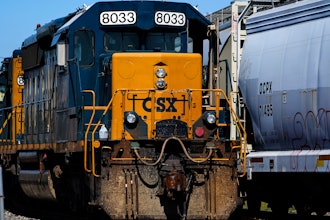WASHINGTON (AP) -- American businesses complained to lawmakers Wednesday about Indian trade protectionism, contending that tariff and regulatory barriers are shutting out foreign firms despite the nation's market-opening reforms.
Advocates for the pharmaceutical, information technology and agricultural industries detailed their grievances to a House subcommittee on trade where lawmakers also grumbled about Indian policies that favor local producers.
"They are for free trade on their terms," said Democrat Rep. Richard Neal.
There's strong bipartisan support for deeper U.S.-India ties, which have been pushed by the administrations of George W. Bush and Barack Obama, and trade has grown markedly in the past decade and is approaching the $100 billion mark. But experts say that total is small, considering the size of the two economies.
"We now need our economic relationship to catch up to the historic progress of our diplomatic and security cooperation," said Daniel Twining, senior fellow for Asia at the German Marshall Fund of the United States.
He said U.S. trade with India is only one-seventh of U.S. trade with China, despite the fact that India is a strategic partner and China is a strategic competitor. Twining said negotiations for a bilateral investment treaty are mired in bureaucracy and called for talks on a free trade agreement.
Arvind Subramanian of the Peterson Institute of Economics said India has seen a sharp slowing in economic growth, and in response embarked in late 2012 on ambitious economic reforms, opening to more foreign investment, such as in multi-brand retail.
The reform effort championed by Prime Minister Manmohan Singh faces stiff political and trade union opposition, and Subramanian said few countries have opened up to foreign capital since the global slowdown to the extent India has.
But he said protectionism has re-surfaced, with India still favoring domestic providers in areas such as banking, telecommunications, retail and solar panels.
Pharmaceutical giant Pfizer Inc., which employs about 5,000 people in India, accused its government of policies that give an unfair advantage to local generic drug producers.
"India has systematically failed to interpret and apply its intellectual property laws in a manner consistent with recognized global standards," said Roy Waldron, the company's chief intellectual property counsel.
In prepared testimony, he cited India's revocation last September of Pfizer's patent for a cancer drug, Sutent, which still enjoys patent protection in 90 other countries. He said the company had provided subsidies for patients that need it.
Health activists and aid groups say the $26 billion Indian generics industry allows the poor who cannot afford Western prices to access drugs to treat diseases such as cancer, malaria and HIV.
The Information Technology Industry Council told the hearing that new regulations could shut out foreign companies from nearly half of India's $20.5 billion information and communications technology market. That includes "onerous" testing and registration requirements by India that take effect April 3.
The trade group's president Dean Garfield said India's so-called preferential market policy unveiled last year is designed to force public and private sectors in India to procure products made at home. In some cases, it's invoking national security grounds, which he said could set a dangerous precedent for other countries to mirror.
"The enlightened and progressive economic policies of two decades ago that enabled India to become a global powerhouse in software and services now seems to be in retreat," Garfield said.
In the agriculture sector — highly sensitive because it remains the lifeblood of much of India's vast and impoverished rural population — lawmakers heard there are major barriers to foreign imports.
Allen Johnson, a former U.S. agricultural trade negotiator, said that for most U.S. export priorities, tariffs can be set as high as 100 percent, although day-to-day the applied tariff may be less if India needs to keep food costs down.
He also cited regulatory barriers, such as on dairy and pork imports that lack "scientific justification."






















